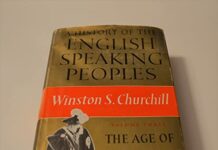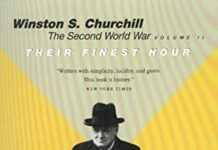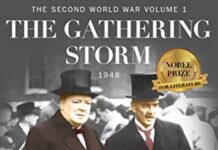
Ebook Info
- Published: 1950
- Number of pages: 1000 pages
- Format: PDF
- File Size: 27.14 MB
- Authors: Winston S. Churchill
Description
The Second World War – The Hinge of Fate – Winston S. Churchill – 1950 Houghton Mifflin Company – BCE
User’s Reviews
Reviews from Amazon users which were colected at the time this book was published on the website:
⭐Thank you, Amazon that I can fill in the gap, complete the series that I bought at a local book sale for about $5. I’ve been looking forward to reading this volume as the rest of the books are a pleasure to read. I am assuming that you like the Churchillian style which is very personal. These books are really all about him; “I wrote to President Roosevelt….” Call it a unique perspective on WWII. There was only one Churchill.
⭐Churchill continues his epic work.
⭐Arrived in promised condition. Very happy.
⭐We now have the complete set! My partner loved it!
⭐Very pleased…..
⭐”The Hinge of Fate” is the fourth of 6 volumes of Winston S. Churchill’s monumental history of World War II. The title is drawn from the fact that it was during the period of this book, late 1941 to the middle of 1942, that the hinge of war turned and the German and Japanese, who were advancing so quickly as the book opened, had started their long march to defeat and destruction. In the early chapters the Japanese are running rampant throughout the Pacific and into the Indian Ocean, threatening even Australia and India, while America was trying to recover from Pearl Harbor. The German Army was running out of steam in Russia, but months of bitter siege lay ahead. In North Africa, the Axis were still struggling with the British for control. In the Atlantic, U-boats exacted their deadly tolls, even within sight of American shores.In the Far East, the Japanese marched through Malaya to the shores of the British bastion, Singapore, whose guns were, unfortunately, pointing to the sea rather that toward the land approaches. There inferior Japanese forces received the greatest surrender in the history of the British Army. The Dutch East Indies and its oil fell to the Japanese while their Navy menaced Ceylon, their Army conquered New Guinea and their pilots bombed Australia.In North Africa the combined Italian-German forces threatened the Suez Canal and made the Mediterranean a hostile Sea for Allied shipping. The surrender at Tobruk, again to inferior enemy forces, was another blow to British confidence and prestige.Churchill is mostly telling the story from his viewpoint, which was not, during this period, limited to Downing Street. The book starts with him visiting at the White House. The reader then follows him to Casablanca, across North Africa, to Moscow and back to Washington.Churchill was a political animal and he tells the political tales. One of the major problems during this period of the war was the rivalries among French leaders: DeGaulle and Giraud, the sensitive prima donnas, and Darlan, the essential officer with a collaborationist past. Winston frequently mentions the American antipathy toward DeGaulle and the uproar created by the arrangements with Darlan, commander of the French Navy, who had so willingly cooperated with the Nazis when they were in the ascendency.No political problem surpassed that of taming the Russian bear. It was up to Churchill to face Stalin’s demands for a second front and then convince him of the impossibility of a landing in Europe in 1942 and the value of the “Second Front” in Africa and the bombings of Germany. The necessity of telling Stalin that the Arctic convoys would be suspended due to unacceptable losses did not make the meetings any more pleasant.We now think of Churchill as the unchallengeable leader of Britain, but this book reminds us of an abortive revolt in the House of Commons in which a motion of censure was introduced in the wake of surrenders at Singapore and Tobruk.Not all was disaster and the Hinge did turn. Before Alamein we never had a victory, after Alamein we never had a defeat. Operation Torch landed American troops in Africa and started them on the road to victory. In the Pacific, the Coral Sea and Midway, which was intended to finish the destruction of the American fleet begun at Pearl Harbor, sent Yamamoto’s air arm to the bottom. By book’s end, Africa was redeemed, the Japanese tide was receding, the Red Army was attacking and the next operation, Sicily or Italy, was being debated.I have been a fan of Churchill’s work since my father suggested that I read it. Now, as I reread it thirty some years later, the attraction has not diminished. It still brings the reader into meetings, conferences, battlefields and the minds of the wars leaders. It is limited by its personal outlook, but nonetheless it remains the indispensable World War II memoir.
⭐Sir Winston Leonard Spencer-Churchill (1874-1965) was a British statesman who was the Prime Minister of the United Kingdom from 1940 to 1945, and then again from 1951 to 1955. He won the Nobel Prize in Literature in 1953 for his historical works, such as (in addition to the present work)
⭐. In 1963, he was made an honorary citizen of the United States (one of only eight people so honored). The other volumes in this set are
⭐,
⭐,
⭐,
⭐,
⭐. It is also available as a complete set:
⭐. [NOTE: page numbers below refer to the 873-page paperback edition.]He wrote in the Preface to this 1950 book, “We had now to face the onslaught of Japan… this volume … is told from the standpoint of the British Prime Minister… Again, I rely upon the series of my directives, telegrams, and minutes… As they are my own composition, written at the time, it is by these that I prefer to be judged. It would be easier to produce a series of afterthoughts when the answers to all the riddles were known, but I must leave this to the historians who will in due course be able to pronounce their considered judgments. I have called this volume ‘The Hinge of History’ because in it we turn from almost uninterrupted disaster to almost unbroken success… And this agreeable change continued to the end of the struggle.”He begins, “The New Year of the Second World War, 1942, opened upon us in an entirely different shape for Britain. We were no longer alone. At our side stood two mighty allies. Russia and the United States were, though for different reasons, irrevocably engaged to fight to the death in the closest concert with the British Empire. This combination made final victory certain unless it broke to pieces under the strain, or unless some entirely new instrument of war appeared in German hands. There was indeed a new instrument of war for which both sides were avidly groping. As it turned out it was into our already stronger hands that the secret of the atomic bomb was destined to fall. A fearful and bloody struggle lay before us and we could not foresee its course, but the end was sure.” (Bk. 1, Ch. 1, pg. 3)He admits of Singapore, “I ought to have known. My advisers ought to have known and I ought to have been told, and I ought to have asked. The reason I had not asked about this matter… was that the possibility of Singapore having no landward defenses no more entered into my mind than that of a battleship being launched without a bottom. I am aware of the various reasons that have been given for this failure… I do not consider these reasons valid. Defenses should have been built.” (Ch. 3, pg. 44)He paid tribute to Nazi General Rommel on January 27 in the House of Commons: “ We have a very daring and skillful opponent against us, and, may I say across the havoc of war, a great general.” He acknowledges, “My reference to Rommel passed off quite well at the moment. Later on I heard that some people had been offended. They could not feel that any virtue should be recognized in an enemy leader. This churlishness is a well-known streak in human nature, but contrary to the spirit in which a war is won or a lasting peace established.” (Ch. 4, pg. 59)He states, “The U-boat attack was our worst evil. It would have been wise for the Germans to stake all upon it… Just as Goering repeatedly shifted his air targets in the Battle of Britain in 1940, so now the U-boat warfare was to some extent weakened for the sake of competing attractions. Nevertheless, it constituted a terrible event in a very bad time.” (Ch. 7, pg. 109)He recounts, “I told the President how much I felt American opinion overestimated the contribution which China could make to the general war. He differed strongly. There were five hundred million people in China. What would happen in this enormous population developed in the same way as Japan had done in the last century and got hold of modern weapons? I replied I was speaking of the present war, which was quite enough to go on with for the time being. I said I would of course always be helpful and polite to the Chinese, whom I admired and liked as a race and pitied for their endless misgovernment, but that he must not expect me to adopt what I felt was a wholly unreal standard of values.” (Ch. 8, pg. 116)He explains, “I always followed… the principle that military commanders should not be judged by results, but by the quality of their effort… I admired the composure and firmness of mind with which [General A.P.] Wavell had faced the cataract of disaster which had been assigned to him with so much formality and precision. Some men would have found reasons for declining, or asked for impossible conditions before accepting a task so baffling and hopeless, failure in which could not but damage their reputation with the public. Wavell’s conduct had conformed to the best traditions of the Army.” (Ch. 8, pg. 125-126)He summarizes, “From this moment all our thoughts turned with sober confidence to the offensive. No longer did we think in terms of where the enemy might strike the next blow, but where we could best strike at him to win back the vast territories that he had overrun in his headlong rush. The road would be long and hard, and massive preparations were still needed to win victory in the East, but the issue was not in doubt; nor need the demands from the Pacific bear too heavily on the great effort the United States was preparing to exert in Europe.” (Ch. 14, pg. 222)He spoke with Roosevelt about north Africa: “‘What can I do to help?’ said Roosevelt. I replied at once, ‘Give us as many Sherman tanks as you can spare…’ … the Americans were better than their word. Three hundred Sherman tanks… and a hundred self-propelled guns were put into six of their fastest ships and sent off to the Suez Canal. The ship containing the engines for all the tanks was sunk by a submarine off Bermuda. Without a single word from us the President and Marshall put a further supply of engines into another fast ship and dispatched it to overtake the convoy. ‘A friend in need is a friend indeed.’” (Ch. 22, pg. 333)He records, “A story—alas, not authenticated—[said] Montgomery spoke of the trials and hazards of a soldier’s career. He gave his whole life to his profession, and lived long years of study and self-restraint. Presently fortune smiled, there came a gleam of success, he gained advancement, opportunity presented itself, he had a great command. He won a victory, he became world-famous, his name was on every lip. Then the luck changed. At one stroke all his life’s work flashed away, perhaps through no fault of his own, and he was flung into the endless catalogue of military failures. ‘But,’ expostulated [General Hastings] Ismay, ‘You ought not to take it so badly… It may well be that you are not going to disaster.’ ‘What?’ cried Montgomery, sitting up in the car. ‘What do you mean? I was talking about Rommel!’” (Bk. 2, Ch. 3, pg. 404-405)He acknowledges, “I had now been twenty-eight months at the head of affairs, during which we had sustained an almost unbroken series of military defeats… We were alive and at bay; but that was all. On the other hand, what a cataract of disasters had fallen upon us!… The fact that we were no longer alone but instead had the two most mighty nations in the world in alliance, fighting desperately at our side, gave indeed assurances of ultimate victory. But this, by removing the sense of mortal peril, only made criticism more free. Was it strange that the whole character and system of the war direction, for which I was responsible, should have been brought into question and challenge?” (Ch. 8, pg. 477-478)He reports with satisfaction, “We had nothing like this superiority at Alamein… For these reasons the Battle of Almein will ever make a glorious page in British military annals. There is another reason why it will survive. It marked in fact the turning of ‘the Hinge of Fate.’ It may almost be said, ‘Before Almein we never had a victory. After Almein we never had a defeat.’” (Ch. 10, pg. 524)He admits, “Memories of the war may be vivid and true, but should never be trusted without verification, especially where the sequence of events is concerned. I certainly made several erroneous statements about the ‘unconditional surrender’ incident, because I said what I thought and believed at the moment without looking up the records. Mine was not the only memory at fault….” (Ch. 15, pg. 597)He observes, “We must now revert to the tremendous drama unfolding around Stalingrad… This crushing disaster to the Germans ended Hitler’s prodigious effort to conquer Russia by force of arms, and destroy Communism by an equally odious form of totalitarian tyranny.” (Ch. 16, pg. 619-620)He comments on the Russian interpretation of the massacre at Katyn: “Their report… [was] that the Polish prisoners fell into German hands and were later slaughtered by them… When we remember the confusion caused by the German advance, that the guards of the camps must have fled as the invaders came nearer, and all the contacts afterwards during the period of Russo-Polish cooperation, belief seems an act of faith.” (Ch. 18, pg. 661)He suggests, “The American chiefs do not like to be outdone in generosity. No people respond more spontaneously to fair play. If you treat Americans well they always want to treat you better. Nevertheless I consider that the argument which convinced the Americans was on its merits overwhelming.” (Ch. 22, pg. 710)Whether one reads it as history, or literature, this series will be absolute “must reading” for anyone even marginally interested in the Second World War. (At the very least, one should read an abridgement, such as
⭐.
Keywords
Free Download The Hinge of Fate (The Second World War, Vol. 4) in PDF format
The Hinge of Fate (The Second World War, Vol. 4) PDF Free Download
Download The Hinge of Fate (The Second World War, Vol. 4) 1950 PDF Free
The Hinge of Fate (The Second World War, Vol. 4) 1950 PDF Free Download
Download The Hinge of Fate (The Second World War, Vol. 4) PDF
Free Download Ebook The Hinge of Fate (The Second World War, Vol. 4)





